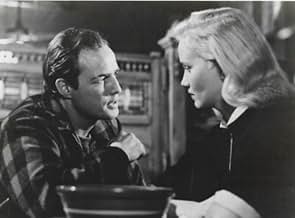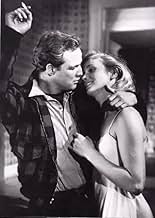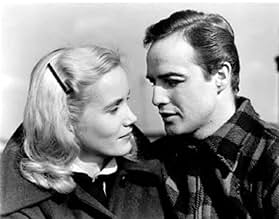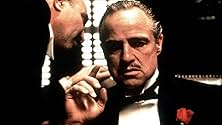La fabuleuse aventure du cinéma américain
Titre original : The Movies
NOTE IMDb
7,8/10
1,6 k
MA NOTE
La série explore le cinéma américain au fil des décennies et les changements culturels, sociaux et politiques qui ont balisé son évolution.La série explore le cinéma américain au fil des décennies et les changements culturels, sociaux et politiques qui ont balisé son évolution.La série explore le cinéma américain au fil des décennies et les changements culturels, sociaux et politiques qui ont balisé son évolution.
Parcourir les épisodes
Avis à la une
CNN Films have been making excellent documentaries for many years now. The first episode in the series called "The Movies" focuses on the movies of the 80s - one of the greatest decades for film and music. Nevertheless, 12 minutes into it, and I found myself resorting to my basic instinct to fast-forward it. I did finish watching it though (I had DVR'd it). However, it was nothing like sitting with my eyes wide open and jaw on the floor for the entire duration of "Apollo 11."
The format of the documentary series is straightforward. A brief interview with an actor, director, or film critic is followed by the relevant movie clip, another interview, a movie clip, and then rare behind-the-scenes footage. More interviews follow, and the cycle repeats until the credits roll. Nothing wrong with the format here but the subjects discussed was random at best.
Even 30 minutes into the 80s episode, I still found it hard to discern the intent of the filmmakers. On the one hand, they appear to be aiming for the lofty goal of examining the confluence of movies and popular culture of a decade, and on the other hand, they seemed to be hell-bent on keeping the entertainment aspect their top priority. This documentary series could have been an excellent opportunity to educate the audience on how the culture of each decade influenced the film making of that era. Had they cared to investigate from the standpoint of Media Anthropology - as a means of understanding audiences and social aspects of mass media - instead of solely relying on the entertainment value of the films, they could have achieved the real purpose behind making a documentary, which, as I mentioned earlier, should be to educate the masses. For a documentary that professes to aim high, it did not feel like an intelligent and in-depth analysis of the impact cinema of any past decade had had on society or vice versa. It is doubtful whether the series as whole succeeds in convincing its viewers that movies are more than the satisfactory crunch of overpriced popcorn under your teeth.
This documentary series is about an art form that focuses on entertainment. However, they seem to have overlooked one crucial detail. They chose to make a documentary on the behind-the-scenes and cultural impact of the movies, but then being a documentary, and it is a fair argument to make, they should have at least focused on educating the masses on why the entertainment industry functions the way it does. Constant titillation with trivia and shallow discourse doesn't exactly do justice, case in point:
In the 80s episode, one moment the guests are gushing over ET and the cultural impact its success had, the next moment the director decides to blast - very briefly, mind you - through the apocalyptic background of Robocop and Mad Max. If you blink right here, you could miss the mention of at least two more films. A few minutes pass and then: A quick peek into how Rob Reiner embarrassed himself imitating an orgasm in front of his on-set mother, and then you get pushed into the sweaty and bloody face of Robert de Niro in Raging Bull. There are tidbits of movie trivia thrown in between these scenes and some more interviews. I must admit the part of John Huges, and his movies were really touching, and I really enjoyed it.
The filmmakers tried to cram a lot in two hours of each episode, including occasional orbits around some social issues before landing squarely on the safe platform of entertainment. This is what generally happens on every episode of the series. There is nothing in any of the two-hour events that you cannot find online, in print or in the Special Features section of a DVD. The entire exercise, though entertaining, seemed futile to me. Needless to say, I for one, am left none the wiser.
The format of the documentary series is straightforward. A brief interview with an actor, director, or film critic is followed by the relevant movie clip, another interview, a movie clip, and then rare behind-the-scenes footage. More interviews follow, and the cycle repeats until the credits roll. Nothing wrong with the format here but the subjects discussed was random at best.
Even 30 minutes into the 80s episode, I still found it hard to discern the intent of the filmmakers. On the one hand, they appear to be aiming for the lofty goal of examining the confluence of movies and popular culture of a decade, and on the other hand, they seemed to be hell-bent on keeping the entertainment aspect their top priority. This documentary series could have been an excellent opportunity to educate the audience on how the culture of each decade influenced the film making of that era. Had they cared to investigate from the standpoint of Media Anthropology - as a means of understanding audiences and social aspects of mass media - instead of solely relying on the entertainment value of the films, they could have achieved the real purpose behind making a documentary, which, as I mentioned earlier, should be to educate the masses. For a documentary that professes to aim high, it did not feel like an intelligent and in-depth analysis of the impact cinema of any past decade had had on society or vice versa. It is doubtful whether the series as whole succeeds in convincing its viewers that movies are more than the satisfactory crunch of overpriced popcorn under your teeth.
This documentary series is about an art form that focuses on entertainment. However, they seem to have overlooked one crucial detail. They chose to make a documentary on the behind-the-scenes and cultural impact of the movies, but then being a documentary, and it is a fair argument to make, they should have at least focused on educating the masses on why the entertainment industry functions the way it does. Constant titillation with trivia and shallow discourse doesn't exactly do justice, case in point:
In the 80s episode, one moment the guests are gushing over ET and the cultural impact its success had, the next moment the director decides to blast - very briefly, mind you - through the apocalyptic background of Robocop and Mad Max. If you blink right here, you could miss the mention of at least two more films. A few minutes pass and then: A quick peek into how Rob Reiner embarrassed himself imitating an orgasm in front of his on-set mother, and then you get pushed into the sweaty and bloody face of Robert de Niro in Raging Bull. There are tidbits of movie trivia thrown in between these scenes and some more interviews. I must admit the part of John Huges, and his movies were really touching, and I really enjoyed it.
The filmmakers tried to cram a lot in two hours of each episode, including occasional orbits around some social issues before landing squarely on the safe platform of entertainment. This is what generally happens on every episode of the series. There is nothing in any of the two-hour events that you cannot find online, in print or in the Special Features section of a DVD. The entire exercise, though entertaining, seemed futile to me. Needless to say, I for one, am left none the wiser.
I can't believe David Lynch was not mentioned once during the nineties episode. Since all the movies in the documentary are American anyway, why isn't this great artist being recognized at all?
And by the way... There are so many great films from the rest of the world as well, but this documentary only focuses on classical Hollywood.
Apart from that, nothing new or shocking is revealed. These are mostly just actors and directors saying they like a movie, one of them actually said it in the form of 'this movie is one of the best' which is the type of comments you often see on the internet that I find ridiculous. I believe this should always be rephrased as 'I find this movie one of the best'. It's all subjective no?
And by the way... There are so many great films from the rest of the world as well, but this documentary only focuses on classical Hollywood.
Apart from that, nothing new or shocking is revealed. These are mostly just actors and directors saying they like a movie, one of them actually said it in the form of 'this movie is one of the best' which is the type of comments you often see on the internet that I find ridiculous. I believe this should always be rephrased as 'I find this movie one of the best'. It's all subjective no?
The purpose of series seems be to remind. Films, actors, directors. And , nothing more. It is enough, for me. Because it is a resurrection of memories, moments, emotions. Sure, it could be better. But my gratitude for the idea and, at the first sigh, simplistic craft, is round. Because it is a good way to discover reactions , testimonies and impressions of actors and directors . So, just good serie.
I expected explanations and how Kurosawa and other foreign directors influenced Hollywood movies but we mostly got list of movies from that era which we already knew. Movies that were significant for black culture were the only thing that were explained well. No Kurosawa no Fellini no Goddard no Ozu no Bergman and Tarkovsky... I loved when Edgar Wright and PTA were talking but that's about it.
1/3 (at most) of each episode dives shallowly into timeless movies of the decade.
1/3 focuses on movies that have political undertones and slants it towards our political enviornment of the last few years.
Finally, any movie that fills the emptiness of the current new social movements.
This series brings you down after every episode.
This series brings you down after every episode.
Le saviez-vous
- AnecdotesThis documentary has an interview with legendary actress, Eva Marie Saint and includes footage of the last time she spoke on camera about her performances in "On The Waterfront" and "North By Northwest"
Meilleurs choix
Connectez-vous pour évaluer et suivre la liste de favoris afin de recevoir des recommandations personnalisées
- How many seasons does The Movies have?Alimenté par Alexa
Détails
Contribuer à cette page
Suggérer une modification ou ajouter du contenu manquant



































